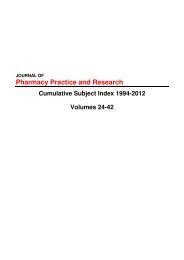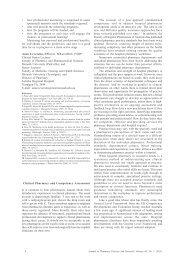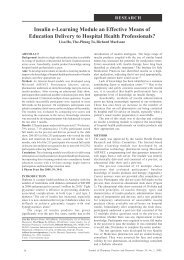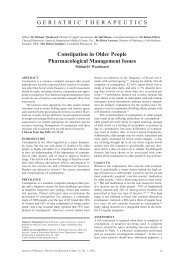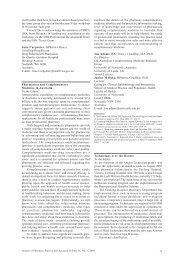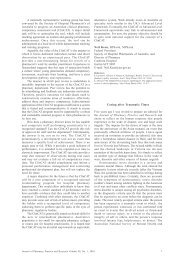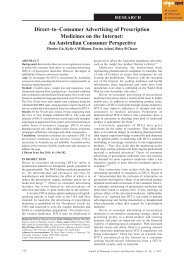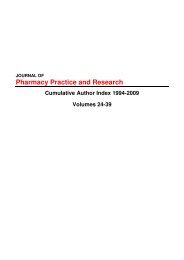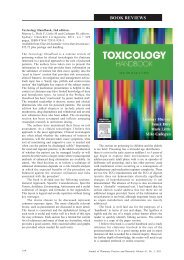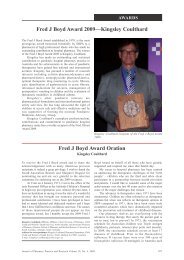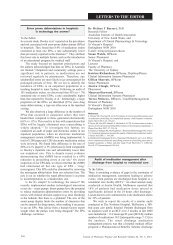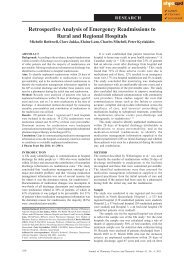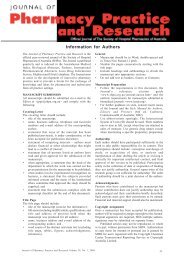Fred J Boyd 2007 Award - jppr
Fred J Boyd 2007 Award - jppr
Fred J Boyd 2007 Award - jppr
You also want an ePaper? Increase the reach of your titles
YUMPU automatically turns print PDFs into web optimized ePapers that Google loves.
and dispensing within the electronic environment? We need<br />
to be careful that some of the gains we have made in the<br />
paper world are reflected in the electronic world at the same<br />
time realising that it is a different paradigm and that making<br />
an electronic system mimic every current business practice is<br />
not always the answer. Even in the last seven days we have<br />
made a number of changes based on the experience of the<br />
users as theory and practice can be quite different.<br />
A systems approach requires analysis. Lucian Leape<br />
groups systems failures into design failures, i.e. design of the<br />
process, task or equipment and organisational failures related<br />
to conditions in the workplace, team building and training. 1<br />
What could be described as an excellent pharmacy service<br />
today will not fulfil the needs in 10 years time. To take<br />
pharmacy into the future we need to constantly look at ways<br />
of improving. This may involve changes to education, teaching<br />
and systems design. We can do this by:<br />
collecting and analysing data (from literature, conferences,<br />
our own data);<br />
disseminating information (via newsletters, the Journal,<br />
presentations within and outside the hospital);<br />
educating (doctors, nurses and patients through a variety<br />
of techniques);<br />
collaborating (within the hospital and outside in groups<br />
such as NSW TAG, and SHPA);<br />
conducting research (whether it is practice based or<br />
medication therapy based); and<br />
not settling for the status quo and embracing change<br />
opportunities.<br />
Australian Clinical Pharmacy <strong>Award</strong> Oration<br />
Neil Cottrell<br />
I would like to start by thanking George Taylor, Peter Fowler<br />
and their colleagues in the Tasmanian Branch of the SHPA<br />
who nominated me for this award. It was a great honour for<br />
me when I was approached by them. I would also like to<br />
thank the Federal Council who chose me to receive the Clinical<br />
Pharmacy <strong>Award</strong> for <strong>2007</strong>. I have to confess that when Sue<br />
Kirsa informed me that I was to receive the award I was<br />
speechless. I felt then and still do feel very honoured and<br />
extremely humbled that my peers had thought me worthy to<br />
receive the Clinical Pharmacy <strong>Award</strong>. The bubble burst<br />
somewhat when Sue then kindly reminded me that I had been<br />
practising as a pharmacist for 25 years and that immediately<br />
brought me back to earth and I felt a lot older.<br />
I then realised that I would be giving an oration here at<br />
the Federal Conference where there would be an expectation<br />
that I would pass on words of wisdom about clinical<br />
pharmacy. I reflected on the previous recipients of this award<br />
and felt extremely nervous about what I had to offer in this<br />
context. Although I stand in front of an audience most days in<br />
my current role as a senior lecturer it is usually with<br />
PowerPoint as a prop in front of me not a written script. I tell<br />
my students that I don’t have a script with PowerPoint I make<br />
it up as I go along. Well not today.<br />
Neil Cottrell, BScPharm(Hons), MScPharm, PhD Candidate, Senior Lecturer,<br />
School of Pharmacy, The University of Queensland, St Lucia, Queensland<br />
Address for correspondence: Neil Cottrell, School of Pharmacy, The<br />
University of Queensland, St Lucia Qld 4072, Australia<br />
E-mail: n.cottrell@uq.edu.au<br />
You do not have to be a director of pharmacy to make<br />
systems changes and practice changes. At every level of<br />
practice whether we are pharmacists or technicians<br />
improvement should be a driver.<br />
Activities such as I have outlined are not one man projects<br />
and I have been very lucky to work with many wonderful<br />
people to help me over the years. I wish to acknowledge my<br />
staff, and the many wonderful pharmacists, technicians and<br />
other people I have come to know through work or SHPA<br />
activities. Special acknowledgement must go to Johneen<br />
Tierney, Karen Kaye, Liz Perks and Terry Maunsell who has<br />
been a mentor, a colleague and a friend. Finally, I need to<br />
acknowledge the support of my mother and father, brothers,<br />
sister and their families including my nephew and nieces where<br />
I am not seen as a pharmacist or an SHPA member but as<br />
Auntie Rosemary.<br />
I have tried to combine the two themes of quality use of<br />
medicines and medication safety in a constantly changing<br />
environment. We need to be aware of the changing<br />
environment in which we work and adjust our processes, our<br />
emphasis and activities to it. As William A Foster said, ‘Quality<br />
is never an accident, it is always the result of high intention,<br />
sincere effort, intelligent directions and skilful execution. It<br />
represents the wise choice of many alternatives’.<br />
Reference<br />
1. Leape L. A systems analysis approach to medical error. In: Cohen M, editor.<br />
Medication errors. Washington DC: American Pharmaceutical Association; 1999.<br />
Rosemary Burke delivered her oration on 11 November<br />
<strong>2007</strong> at the 28th SHPA Federal Conference in Sydney.<br />
I thought that I would share some insights that I have<br />
gained in moving over to the university. I see my new role as<br />
one that tries to enrich, engage and instil into the students all<br />
about the marvellous profession and career that they are going<br />
to embark upon.<br />
But in sharing those insights with you I need to go back<br />
in time first. I am sure that you can all remember your first<br />
day as a pre-registration graduate and maybe even your first<br />
day on the wards. I can remember mine. Just take a moment<br />
to reflect back (I know some of you like me may find that a<br />
bit harder to do). That feeling of total inadequacy where I<br />
hoped no one would speak to me or even worse ask me a<br />
question. Nothing I seemed to have done at university could<br />
be remembered or had prepared me for the ward environment<br />
in a busy hospital. Yes hospitals were busy even in my day.<br />
However, I was incredibly fortunate to have some wonderful<br />
pharmacists around me who became mentors, role models<br />
and eventually colleagues. It was their patience,<br />
encouragement, nurturing and unselfish sharing of their<br />
knowledge that allowed me to grow as a clinical pharmacist,<br />
a professional and importantly as a person. In the UK, I would<br />
like to pay tribute to Geoff Bourne, Ray Fitzpatrick, Judy<br />
Cantrill and Jonathon Cooke (the last three of whom<br />
eventually became professors), I am forever indebted to them.<br />
But it didn’t stop there and when I traversed the world I was<br />
fortunate to meet the likes of Jeff Hughes, Chris Alderman,<br />
Deborah Rowett and of course I could not do this oration<br />
without mentioning my partner in crime, Ian Coombes, true<br />
role models for me still to aspire to.<br />
Journal of Pharmacy Practice and Research Volume 37, No. 4, <strong>2007</strong> 319



